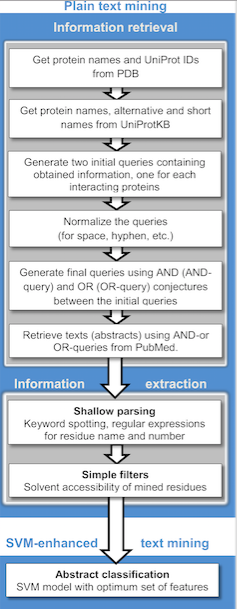Protein–protein interaction
(Redirected from Protein-protein interaction)
Protein–protein interactions (PPIs) are physical contacts of high specificity established between two or more protein molecules as a result of biochemical events steered by electrostatic forces, hydrogen bonding, and the hydrophobic effect. PPIs are critical for many processes within the cell, including signal transduction, cellular motion, and the regulation of the cell cycle.
Overview[edit | edit source]
Protein–protein interactions are at the heart of the cellular machinery, with a single protein capable of binding to potentially dozens of partners with distinct functions. Understanding PPIs is crucial for elucidating the molecular basis of diseases and can aid in the development of new therapeutic approaches. Proteins interact through their amino acid sequences, which can form enzyme-substrate complexes, regulatory complexes, and structural complexes, among others.
Types of Protein–Protein Interactions[edit | edit source]
PPIs can be broadly classified into two categories: transient and permanent. Transient interactions are dynamic and usually occur in response to a specific cellular event, such as the activation of a signal transduction pathway. Permanent interactions are more stable and are typically found in multi-protein complexes, such as those forming part of the ribosome or proteasome.
Transient Interactions[edit | edit source]
Transient PPIs are characterized by a temporary association between proteins. These interactions are crucial for signal transduction and the regulation of various cellular processes. Examples include the interaction between hormones and their receptors, and the interactions among proteins in the MAP kinase pathway.
Permanent Interactions[edit | edit source]
Permanent PPIs result in the formation of stable protein complexes. These are essential for the structure and function of the cells, contributing to the formation of the cytoskeleton, the replication of DNA, and the transcription of genes. An example of a permanent interaction is the complex between histones and DNA, which forms the nucleosome, the basic unit of chromatin.
Methods for Studying Protein–Protein Interactions[edit | edit source]
Several techniques have been developed to study PPIs, including:
- Yeast two-hybrid screening: A genetic method used to discover PPIs by detecting the physical interaction between two proteins in yeast.
- Co-immunoprecipitation (Co-IP): A biochemical method to detect PPIs by using an antibody to precipitate one protein and identifying associated proteins.
- Surface plasmon resonance (SPR): A method that can quantify PPIs in real-time by measuring changes in the refractive index near the surface of a sensor chip where proteins are immobilized.
- Mass spectrometry (MS): Used in combination with various chromatography techniques to identify protein complexes and their components.
Significance of Protein–Protein Interactions[edit | edit source]
Understanding PPIs is fundamental to comprehending the functional organization of the proteome. It has implications in understanding cellular processes and the molecular basis of diseases. Moreover, targeting PPIs with small molecules to modulate protein functions has emerged as a promising strategy in drug discovery. Disrupting aberrant PPIs can lead to the development of new therapies for diseases such as cancer, Alzheimer's disease, and infectious diseases.
Challenges in Studying Protein–Protein Interactions[edit | edit source]
Despite advances in technology, studying PPIs remains challenging due to the dynamic and complex nature of these interactions. Many PPIs are transient, making them difficult to capture and study. Additionally, the cellular context can significantly influence PPIs, necessitating in vivo studies for accurate characterization.
Search WikiMD
Ad.Tired of being Overweight? Try W8MD's physician weight loss program.
Semaglutide (Ozempic / Wegovy and Tirzepatide (Mounjaro / Zepbound) available.
Advertise on WikiMD
|
WikiMD's Wellness Encyclopedia |
| Let Food Be Thy Medicine Medicine Thy Food - Hippocrates |
Translate this page: - East Asian
中文,
日本,
한국어,
South Asian
हिन्दी,
தமிழ்,
తెలుగు,
Urdu,
ಕನ್ನಡ,
Southeast Asian
Indonesian,
Vietnamese,
Thai,
မြန်မာဘာသာ,
বাংলা
European
español,
Deutsch,
français,
Greek,
português do Brasil,
polski,
română,
русский,
Nederlands,
norsk,
svenska,
suomi,
Italian
Middle Eastern & African
عربى,
Turkish,
Persian,
Hebrew,
Afrikaans,
isiZulu,
Kiswahili,
Other
Bulgarian,
Hungarian,
Czech,
Swedish,
മലയാളം,
मराठी,
ਪੰਜਾਬੀ,
ગુજરાતી,
Portuguese,
Ukrainian
Medical Disclaimer: WikiMD is not a substitute for professional medical advice. The information on WikiMD is provided as an information resource only, may be incorrect, outdated or misleading, and is not to be used or relied on for any diagnostic or treatment purposes. Please consult your health care provider before making any healthcare decisions or for guidance about a specific medical condition. WikiMD expressly disclaims responsibility, and shall have no liability, for any damages, loss, injury, or liability whatsoever suffered as a result of your reliance on the information contained in this site. By visiting this site you agree to the foregoing terms and conditions, which may from time to time be changed or supplemented by WikiMD. If you do not agree to the foregoing terms and conditions, you should not enter or use this site. See full disclaimer.
Credits:Most images are courtesy of Wikimedia commons, and templates, categories Wikipedia, licensed under CC BY SA or similar.
Contributors: Prab R. Tumpati, MD






